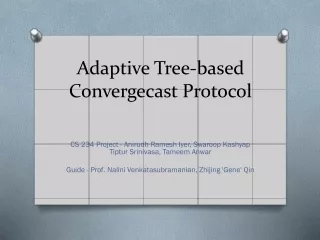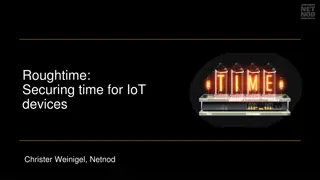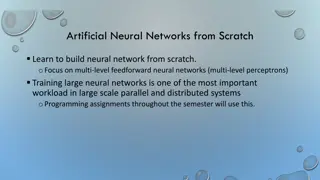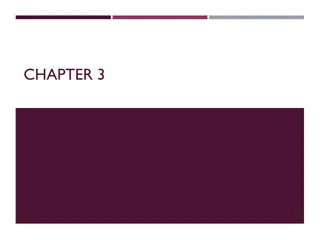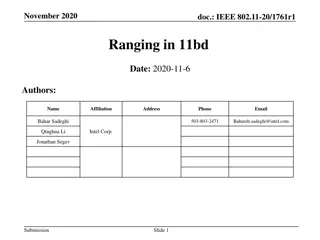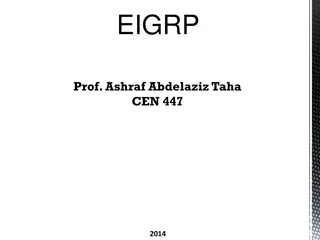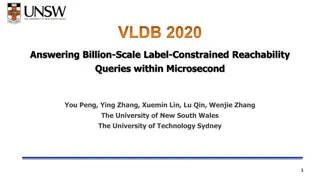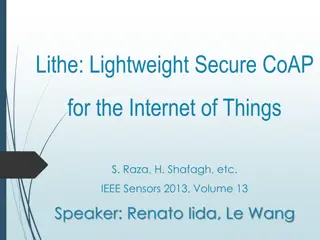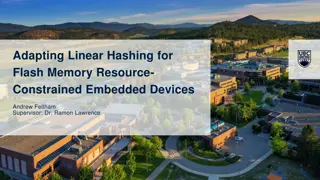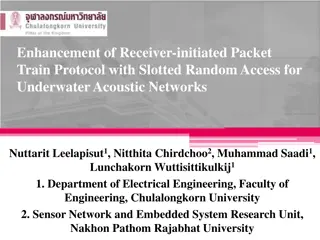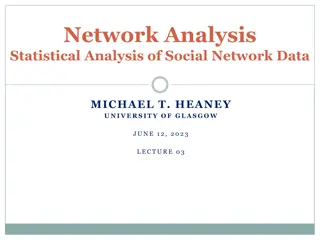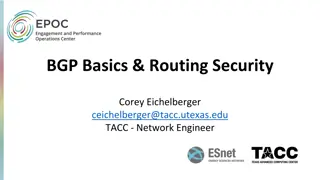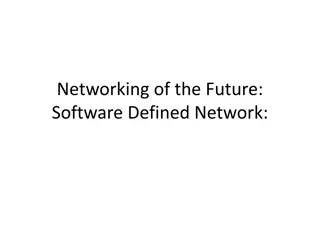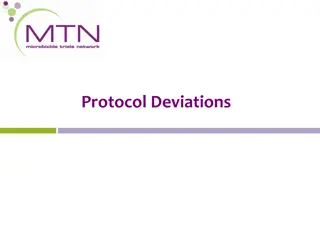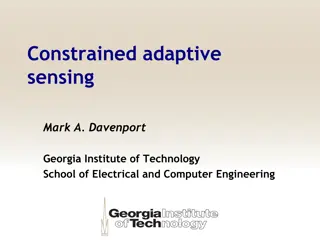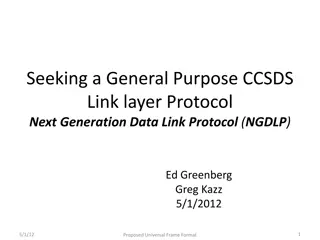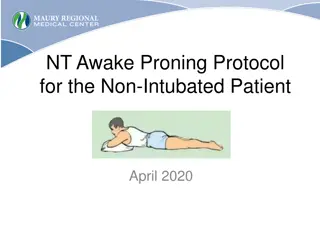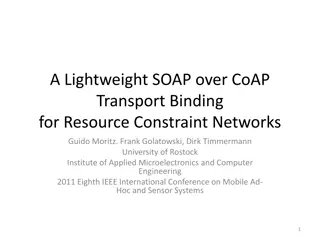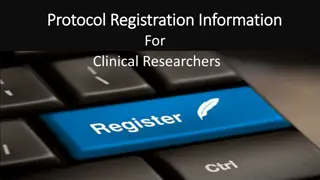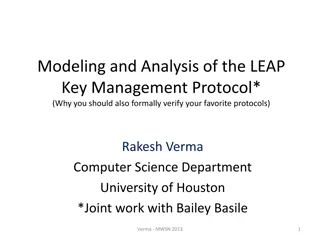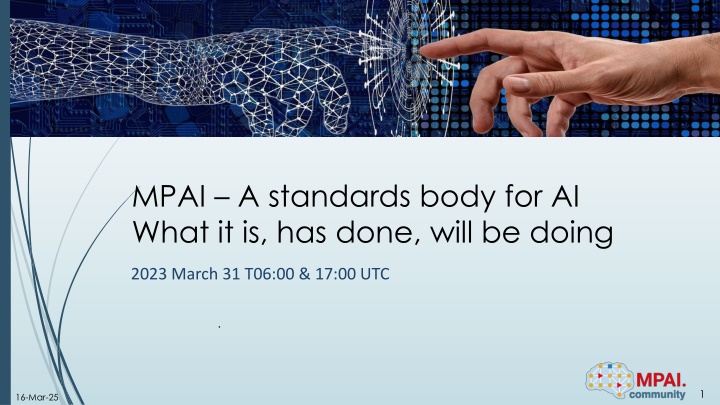
CoAP: Constrained Application Protocol - Defined for Constrained IP Networks
The Constrained Application Protocol (CoAP) is a specialized protocol designed by IETF CoRE WG for managing resources on devices within constrained IP networks. CoAP is both synchronous and asynchronous, tailored for M2M applications with easy proxying to/from HTTP. It is not a replacement for HTTP but serves as a RESTful protocol suitable for devices with limited resources and intermittent connectivity.
Download Presentation

Please find below an Image/Link to download the presentation.
The content on the website is provided AS IS for your information and personal use only. It may not be sold, licensed, or shared on other websites without obtaining consent from the author. If you encounter any issues during the download, it is possible that the publisher has removed the file from their server.
You are allowed to download the files provided on this website for personal or commercial use, subject to the condition that they are used lawfully. All files are the property of their respective owners.
The content on the website is provided AS IS for your information and personal use only. It may not be sold, licensed, or shared on other websites without obtaining consent from the author.
E N D
Presentation Transcript
MPAI A standards body for AI What it is, has done, will be doing 2023 March 31 T06:00 & 17:00 UTC . 1 16-Mar-25
MPAI Mission, organisation, and activities Leonardo Chiariglione, MPAI, 2023 March 31 T06:00 & 17:00 UTC 2 16-Mar-25
Why this event? For 30 months MPAI has been guided by three important principles: Standards are important. Data coding is important. Artificial intelligence is important. With today s, we intend to share with the community What we are What we have achieved What we are our plans 3 16-Mar-25
1 What is MPAI A not-for-profit organisation incorporated in Switzerland with the mission to promote the efficient use of Data by: 1. Developing Technical Specifications of: 1. Coding of Data, especially using new technologies such as Artificial Intelligence. 2. Technologies that facilitate integration of Data Coding components in Information and Communication Technology systems. 2. Bridging the gap between Technical Specifications and their practical use through the development of Intellectual Property Rights Guidelines. 4 16-Mar-25
2 Who can be an MPAI member Two types of members Legal entities. Individuals representing technical departments of universities Conditions to be members Support the MPAI mission. Be able to contribute to the development of Technical Specifications for the efficient use of data Two classes of membership Principal: vote at General Assemblies Associate: participate in technical work on par with Principal Members 5 16-Mar-25
3 The MPAI process Stage 0 Stage 1 Stage 2 Stage 3 Interest Collection Use Cases Functional Requirements Commercial Requirements Technical Specification Reference Software Call for Technologies Community Comments Standard Development Conformance Testing Reference Software Performance Assessment Stage 7 Stage 5 Stage 4 Stage 6 Principal Members All All Members 6 16-Mar-25
4 MPAI approach to standardisation AI AI Open market of components with standardises functions and Interfaces, competing in performance. Module (AIM) Module (AIM) Outputs Inputs User Agent AI Workflow (AIW) AI AIM Storage AI Module (AIM) Module (AIM) Controller Global Storage MPAI Store Communication Access MPAI-AIF enables independently sourced AI Modules having standardised interfaces to be executed in an environment with standardised APIs. 7 16-Mar-25
5 The MPAI organisation General Assembly Board of Directors IPR Membership & Nominating Finance & Audit Secretariat Support Industry & Standards Commu nication Development Committees Standing Committees GME -DC NNW -DC AIF- DC MMC- DC CAE- DC CUI- DC Requirements Standing Committee ARA AIH CAV GSA SPG EEV EVC OSD XRV MCS MMM 8 16-Mar-25
6 Bridging the gap Before initiating a standard, Active Principal Members develop & adopt the Framework Licence, a licence without values: $, %, dates etc. The Framework Licence states that the eventual licence will be issued: 1. At a cost comparable with similar standard technologies. 2. Not after products are on the market. During the development, any Member making a contribution declares it will make its licence available according to the Framework Licence. After the development, Members holding IP in the standard select the preferred patent pool administrator. 9 16-Mar-25
7 MPAI results so far Title V TS RS CT PA TR AI Framework 1 X X Content-based Audio Enhancement 2 X Compression and Understanding of Industrial Data 1 X X X X Governance of the MPAI Ecosystem Multimodal Conversation 1 1 X X Neural Network Watermarking 1 X X MPAI Metaverse Model - Functionalities 1 X MPAI offers a fast and rigorous process to develop standards: 12 months from the proposal of Neural Network Watermarking to specification and software. 10 16-Mar-25
8 MPAI reaches out to more communities IEEE has adopted without modification three MPAI Technical Specifications as IEEE Standards. Multimodal Conversation is IEEE 3300- 2022 AI Framework is IEEE 3301-2022 Context-based Audio Enhancement is IEEE 3302-2022 Two more MPAI Technical Specifications are in the IEEE pipeline Compression and Understanding of Industrial Data, currently IEEE P3303 Neural Network Watermarking , currently IEEE P3304 11 16-Mar-25
9 MPAI today New Technical Specification: Avatar Representation and Animation Extended Technical Specifications AI Framework Multimodal Conversation Context-base Audio Enhancement (done) Extended Technical Reports MPAI Metaverse Model Functionality Profiles (ComCom) 12 16-Mar-25
10 MPAI tomorrow AI Health Call for Technologies XR Venues Call for Technologies Connected Autonomous Vehicles Technical Report End-to-End Video Coding (UC&FR) AI-Enhanced Video Coding (UC&FR) Server-based Predictive Multiplayer Gaming (UC&FR) 13 16-Mar-25
Two sessions: for the East (of GMT) Speaker Country CH US US US US CH KR KR FR IT IT PT UK CN IT IT Title Time L. Chiariglione M. Bosi S. Dukes E. Lantz D. Schultens S. Casale-Brunet J. Yoon M. Choi M. Mitrea G. Perboli A. Basso A. De Almeida P. Ribeca C. Jia R. Iacoviello M. Mazzaglia MPAI Mission, organisation and activities 06:00 Enhancing audio with AI Connecting with standards organisations 06:40 AI-powered XR Venues Connected Autonomous Vehicles MPAI Metaverse Model Avatar interoperability Human and computers converse Watermarking Neural Networks Predicting company performance Multi-source AI apps Federated AI for Health MPAI Ecosystem Governance End-to-End Video Coding AI-Enhanced Video Coding Better and fairer online games with AI 06:20 07:00 10:00 07:40 08:00 08:20 08:40 09:00 09:20 09:40 10:00 10:20 10:40 11:00 14 16-Mar-25
Two sessions: for the West (of GMT) Speaker Country CH CN UK IT CH IT US US IT FR PT IT IT US US US Title Time 17:00 17:20 17:40 18:00 18:20 18:40 19:00 19:20 19:40 20:00 20:20 20:40 21:00 21:20 21:40 22:00 L. Chiariglione C. Jia P. Ribeca A. Basso S. Casale-Brunet A. Bottino M. Bosi M. Seligman G. Perboli M. Mitrea M. Breternitz R. Iacoviello M. Mazzaglia D. Schultens E. Lantz S. Dukes MPAI Mission, organisation and activities End-to-End Video Coding MPAI Ecosystem Governance Multi-source AI apps MPAI Metaverse Model Avatar interoperability Enhancing audio with AI Human and computers converse Predicting company performance Watermarking Neural Networks Federated AI for Health AI-Enhanced Video Coding Better and fairer online games with AI Connected Autonomous Vehicles AI-powered XR Venues Connecting with standards organisations 15 16-Mar-25
Join MPAI Share the fun Build the future https://mpai.community/ 16 16-Mar-25
Speakers Ana Maria de Almeida is an Associate Professor at the Department of Information Sciences and Technologies, in ISCTE University Institute of Lisbon in Portugal and a researcher at ISTAR Iscte and CISUC-Center for Informatics and Systems. Ed Lantz, Founder and CEO of Vortex Immersion Media. Ed left aerospace engineering in 1990 to develop next-generation digital dome theartrs for science centres and planetariums. He founded Vortex Immersion in 2007 to bring immersive domes into mainstream arts and entertainment. Ed is passionate about the potential for AI technologies to revolutionize out-of-home immersive experiences. Guido Perboli, is full professor in Decision Making and AI at Politecnico di Torino. He has more than 20 years of expertise in uncertainty management in strategic decisions and, more recently, risk management. 17 16-Mar-25
Speakers Mauricio Breternitz is a Principal Researcher at the ISTAR Laboratory of the ISCTE Instituto Universitario de Lisboa in Portugal. Mauricio got his PhD in Electrical and Computer Engineering at Carnegie Mellon and developed his career on computer architecture research at Intel Labs, AMD Research, IBM Research and others in the USA. He holds 57 issued U.S. patents and has been working on a COVID detection project which informed the work to be presented under MPAI-AIH. Roberto Iacoviello is a Lead Research Engineer who graduated from the Politecnico di Torino and has been employed at Rai R&D since 2007. His research is currently concentrated on developing artificial intelligence applications in video compression and point clouds, next- generation television services such as virtual production for broadcast television. He leads two groups at the European Broadcasting Union (EBU) , namely the Video Evaluation group and the Computer Graphics Animation group. Additionally, he is involved in two EC- funded projects, namely AI4MEDIA and XRECO. 18 16-Mar-25
Speakers Dr. Mark Seligman is Chief Linguist at Speech Morphing, Inc., a vendor of text- to-speech and speech translation services. Mark is also Founder, President, and CEO of Spoken Translation, Inc. In 1998, he organized the first speech translation system demonstrating broad coverage with acceptable quality. He serves on the Advisory Board of TAUS (the Translation Automation Users Society) and on the Steering Committee of IWSLT (the International Workshop for Spoken Language Translation). Mark also publishes on speech translation and cognitive science topics. 19 16-Mar-25

